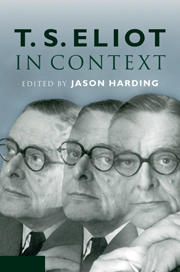Book contents
- Frontmatter
- Contents
- List of illustrations
- List of contributors
- Acknowledgements
- List of abbreviations
- Introduction
- PART ONE LIFE
- PART TWO FORMS
- PART THREE LITERARY CROSS-CURRENTS
- 16 Allusion: the case of Shakespeare
- 17 Classics
- 18 Dante
- 19 Seventeenth-century literature
- 20 Romantic and Victorian poetry
- 21 French poetry
- 22 Georgian poetry
- 23 Bloomsbury
- 24 Ezra Pound
- 25 The avant-garde
- PART FOUR POLITICS, SOCIETY AND CULTURE
- PART FIVE RECEPTION
- Further reading
- Index
19 - Seventeenth-century literature
Published online by Cambridge University Press: 05 August 2012
- Frontmatter
- Contents
- List of illustrations
- List of contributors
- Acknowledgements
- List of abbreviations
- Introduction
- PART ONE LIFE
- PART TWO FORMS
- PART THREE LITERARY CROSS-CURRENTS
- 16 Allusion: the case of Shakespeare
- 17 Classics
- 18 Dante
- 19 Seventeenth-century literature
- 20 Romantic and Victorian poetry
- 21 French poetry
- 22 Georgian poetry
- 23 Bloomsbury
- 24 Ezra Pound
- 25 The avant-garde
- PART FOUR POLITICS, SOCIETY AND CULTURE
- PART FIVE RECEPTION
- Further reading
- Index
Summary
William Empson, an independent mind if such a thing ever existed, did not begrudge Eliot an odd honour. ‘I do not propose’, he wrote in 1948,
to try to judge or define the achievement of Eliot; indeed I feel, like most other verse writers of my generation, that I do not know for certain how much of my own mind he invented, let alone how much of it is a reaction against him or indeed a consequence of misreading him. He has a very penetrating influence, perhaps not unlike an east wind.
Eliot himself was occasionally tossed by the wind of his own intellectual influence. In 1956 he acknowledged obliquely ‘a few notorious phrases which have had a truly embarrassing success in the world’ (OPP, 106) and in 1961 he disavowed with more aplomb his ‘generalizations, and the phrases which have flourished, such as “dissociation of sensibility” and “objective correlative”’:
They have been accepted, they have been rejected, they may soon go out of fashion completely: but they have served their turn as stimuli to the critical thinking of others. And literary criticism, as I hinted at the beginning, is an instinctive activity of the civilized mind. But I prophesy that if my phrases are given consideration, a century hence, it will be only in their historical context, by scholars interested in the mind of my generation.
(TCC, 19)- Type
- Chapter
- Information
- T. S. Eliot in Context , pp. 190 - 199Publisher: Cambridge University PressPrint publication year: 2011



